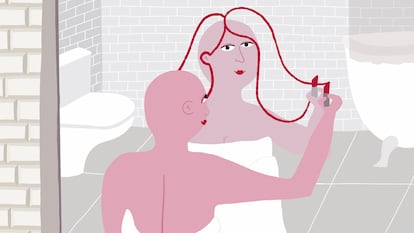We need to talk about alopecia–and Jada Pinkett would agree
The actress’s illness is a clear example of how beauty standards affect us psychologically

The fallout from this year’s Oscars ceremony has brought attention to the struggle of women who, like Jada Pinkett, live with alopecia areata. Beyond the controversy generated by her husband Will Smith’s slapping Chris Rock, the host of the gala who made fun of Pinkett’s illness, the episode has highlighted a reality unknown to much of society. In hospital psychology appointments, it is not uncommon to hear testimonies from women scared about hair loss. The phenomenon has grown more common during the pandemic. Sustained stress over time can cause intense hair loss, called telogen effluvium. Although the condition is conspicuous, the lost hair can be recovered. In the cases of alopecia areata, though, hair loss is more permanent.
This type of alopecia can deeply impact women’s emotional state and quality of life. The condition doesn’t tend to affect men in the same way: they tend to adapt better to its consequences, as they face different social imperatives on beauty and hair. Some women who suffer from alopecia describe feelings of helplessness, linked to them feeling less feminine. Hair plays an important role in identity and self-image, and its loss can be a blow to self-esteem.
Some women who suffer from hair loss may develop obsessive thoughts or behaviors, such as compulsively checking for hair loss at night by counting every hair on the pillow. If their hair grows back, they may get nervous every time they take a shower.
Those recently diagnosed with alopecia may be scared and overwhelmed. They may feel unable to make some decisions; it might be difficult to explain the disease to those around them, and they may feel guilty if the diagnosis has to do with stress management on a personal level. Women who suffer from alopecia often hide their hair loss with wigs or scarves. Hair loss could affect their relationship with their partner or their sex lives. In their work environment, they may feel shame and fear of being judged. Some women with alopecia even consider leaving their job because of the condition. They may abandon activities such as going to the pool or the beach. The pitying and curious looks from strangers can grow unbearable. And they are also often forced to clear up misunderstandings, such as when someone thinks they have cancer (needless to say, women whose hair loss is the result of chemotherapy treatment also suffer from hair loss, usually only temporarily).
Any skin disease is affected by the psychological state of the patient. In some cases of alopecia, it may be linked to symptoms of depression, stress and anxiety. Although a percentage of patients suffering from alopecia or any skin disorder can be seen by a dermatologist without requiring a referral to a psychiatrist or psychologist, in many cases, joint consultation is required.
Psychological interventions related to alopecia generally aim to modify behaviors, thoughts, and emotions related to body image and acceptance of the disease. Most of the effective techniques in psychology derive from cognitive-behavioral therapy, such as progressive exposure that is aimed at reducing harmful repetitive behaviors and eliminating avoidance behaviors. Group therapy is also an effective strategy, as participants may feel less shame around others who suffer from the same ailment. Psychological treatments for alopecia can help patients to work past the guilt of feeling responsible for the origin of their disease. Their aim is to increase patients’ resilience in the face of the disease.
The psychological and social impact of dermatological diseases cannot be underestimated. It is necessary to increase investment and mental health support for people with skin diseases. Society must treat at people who suffer from alopecia areata with respect and dignity, avoiding easy jokes.
Tu suscripción se está usando en otro dispositivo
¿Quieres añadir otro usuario a tu suscripción?
Si continúas leyendo en este dispositivo, no se podrá leer en el otro.
FlechaTu suscripción se está usando en otro dispositivo y solo puedes acceder a EL PAÍS desde un dispositivo a la vez.
Si quieres compartir tu cuenta, cambia tu suscripción a la modalidad Premium, así podrás añadir otro usuario. Cada uno accederá con su propia cuenta de email, lo que os permitirá personalizar vuestra experiencia en EL PAÍS.
¿Tienes una suscripción de empresa? Accede aquí para contratar más cuentas.
En el caso de no saber quién está usando tu cuenta, te recomendamos cambiar tu contraseña aquí.
Si decides continuar compartiendo tu cuenta, este mensaje se mostrará en tu dispositivo y en el de la otra persona que está usando tu cuenta de forma indefinida, afectando a tu experiencia de lectura. Puedes consultar aquí los términos y condiciones de la suscripción digital.








































